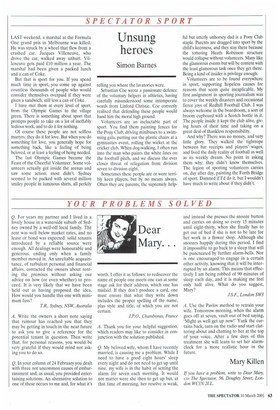Unsung heroes
Simon Barnes
LAST weekend, a marshal at the Formula One grand prix in Melbourne was killed. He was struck by a wheel that flew from a crashed car. Jacques Villeneuve, who drove the car, walked away unhurt. Villeneuve gets paid 110 million a year. The marshal had been given a packed lunch and a can of Coke.
But that is sport for you. If you spend much time in sport, you come up against countless thousands of people who would consider themselves overpaid if they were given a sandwich, still less a can of Coke.
I have met them at every level of sport, from the Olympic Games to the village green. There is something about sport that prompts people to take on a lot of ineffably tedious work, and to dolt for nothing.
Of course these people are not selfless martyrs; they do it for love. But when you do something for love, you generally hope for something back, like a feeling of being beloved, or at least a feeling of being needed.
The last Olympic Games became the Feast of the Cheerful Volunteer. Some volunteers actually got inside the arenas and saw some action; most didn't. Sydney seemed to be packed with several million smiley people in luminous shirts, all perkily telling you where the lavatories were.
Sebastian Coe wrote a passionate defence of the voluntary helpers in athletics, having carefully misunderstood some intemperate words from Linford Christie. Coe correctly realised that defending these people would hand him the moral high ground.
Volunteers are an ineluctable part of sport. You find them painting fences for the Pony Club, driving minibuses to a swimming gala, putting out the plastic chairs at a gymnastics event, rolling the wicket at the cricket club. When dog-walking, I often run into the man who paints the white lines on the football pitch, and we discuss the ever closer threat of relegation from division seven to division eight.
Sometimes these people are or were terribly keen players, but by no means always. Often they are parents; the supremely help
ful but utterly unhorsey dad is a Pony Club staple. Parents are dragged into sport by the child's keenness, and they stay there because the tottering Heath Robinson structure would collapse without volunteers. Many like the glamorous events but will be content with the least glamorous task once they get there. Being a kind of insider is privilege enough.
Volunteers are to be found everywhere in sport, supporting hopeless causes for reasons that seem quite inexplicable. My first assignment in sporting journalism was to cover the weekly disasters and occasional fierce joys of Redhill Football Club. I was always welcome in the boardroom, a sort of broom cupboard with a Scotch bottle in it. The people inside it kept the club alive, giving hours of their time and taking on a great deal of thankless responsibility.
And why? There was no money, and very little glory. They walked the tightrope between bar receipts and players' wages, and lived the daily reality of football as well as its weekly dream. No point in asking them why: they didn't know themselves. The legion of sporting volunteers carries on, day after day, painting the Forth Bridge of sport. Damned if I'd do it, but I wouldn't have much to write about if they didn't.


































































 Previous page
Previous page